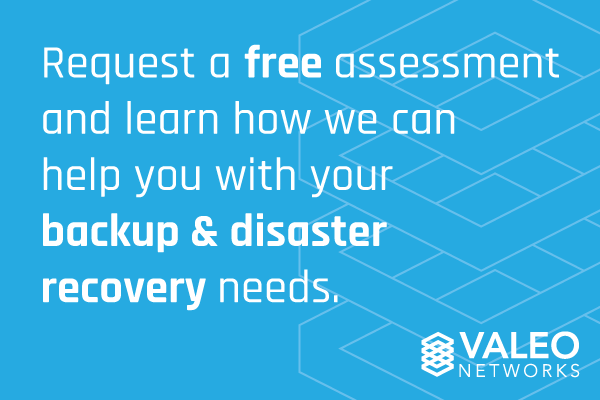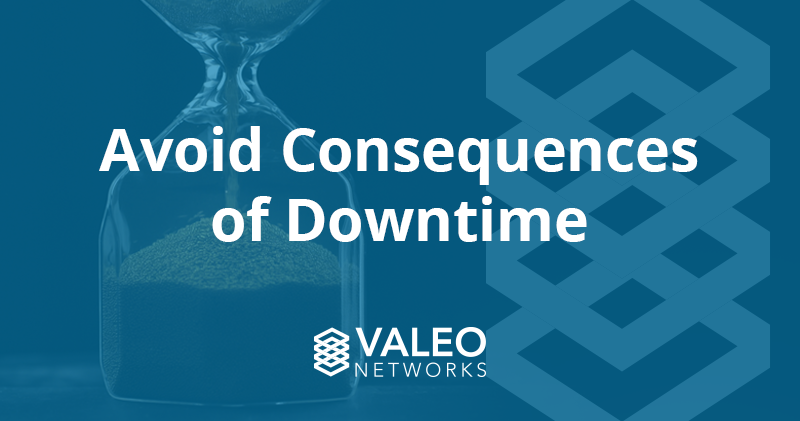5 Reasons You Should Be Investing in Backup and Disaster Recovery Solutions
As a business owner, you need to protect your assets. This includes the important data that you rely on for your day to day operations. Without...
4 min read
Valeo Networks : Jun 19, 2020 12:00:00 AM
Today, most businesses are centered around their technology and their IT infrastructure. It dictates how efficient you can conduct your business, how effectively you can track and store your important information, and just generally keeps your business safe. For this reason, you need to take the steps necessary in order to establish a plan for when this technology is compromised.
Preparing for the worst may seem like a pessimistic point of view, but it’s a necessary and realistic one. The savvy business owner will have a plan of attack for when disaster strikes and they will be the ones who are able to recover from the unforeseen. In this blog we are going to discuss 5 steps that you can take to create an infallible disaster recovery plan.
No matter how safe you may think your data is, there is always that chance that human error, natural disasters, outages, or cyberattackers can prove this mindset wrong. Disaster recovery planning is a part of your business continuity plan that represents a strategy your business takes in the event of a technology disaster.
.webp?width=600&height=400&name=6-1%20(1).webp)
A well thought out disaster recovery plan will usually include some or all of the following:
These disasters will usually destroy or compromise part or all of a business’s IT resources, which includes that important data and information you work so hard to protect. Disaster recovery planning involves the IT systems that are in place to help support your most important business operations and keep as much of those resources intact, ready to be restored. Without this, you leave yourself open to losing important data with no method of getting it back. Just a few of the main benefits in creating a disaster recovery plan include:
Now that you have an understanding of what a disaster recovery plan typically includes and why it’s so important to your business, you can start developing your own plan. Strategizing and really taking a deep dive into your IT infrastructure is going to benefit you in the long run. Keep your knowledge of your business technology in the back of your mind when developing this plan of attack.

Taking that deep dive into your business technology means analyzing all of your assets and determining which ones are the most important to your operations. Also having a full understanding of the role each asset plays in your day to day processes is key to having an effective disaster recovery plan. By identifying and making note of these things, you can better equip yourself to protect your assets and the infrastructure that your business relies on.
RTO is the time you know your business can survive during downtime. Anything past this point you’ve determined can be devastating and become difficult to bounce back from. Having a deadline in place to get your systems back up and running is an important factor of creating a realistic strategy for recovery.
RPO refers to the amount of data you’ve determined your business can afford to lose before the losses become unacceptable. The reality of a disaster is that you are going to lose data. It’s important to realize and take note of just how much you can afford to lose.
Determining both your RTO and RPO will help you to fully optimize your disaster recovery plan.
It’s important that once you’ve developed your plan of attack, that you document this in writing. Creating clear emergency response instructions and procedures takes any of the guesswork out of the equation when the situation is real. When a disaster strikes, things will be moving quickly. The last thing you need in this situation is to be running around trying to figure out exactly what you had planned ahead of time. Make sure you document the steps it takes for the response procedures to be effective.
Once you have the backbone of your plan in place, it’s time to communicate with your employees and train them in what their role will be. This is a step that cannot be forgotten under any circumstances. If those employees with roles in the disaster plan don’t understand what their responsibility is, the whole plan can fall apart. Having even one employee unsure of their role during the recovery process will only add more stress to an already stressful situation. Make life a little easier on all those involved and keep everyone up to date on their part in the strategy.
Ensure that everyone is ready to do their part when an actual disaster occurs by testing ahead of time. Making it a routine to run through tests of your disaster recovery plan means that when the time comes, everyone will be able to act quickly. This will also give you insight into which parts of the procedure may need some fine tuning.

As your business grows, so do the risks. As you experience growth, your routine tests will determine whether or not your original procedures will still work as expected with any of the changes that have accompanied those developments.
If you have been holding off on creating a plan for when the inevitable disaster strikes, it’s important that you now make it a priority. Everyone wants to feel as if their data and important information is safe, but the reality is that we’re all vulnerable to these unfortunate occurrences. If you’re ready to move forward and create a solid strategy for protecting your business’s most important assets, give our team at Valeo Networks a call. We can set you up with a free consultation that includes a specified, customized, budget friendly disaster recovery plan. Don’t wait for a disaster to strike, plan ahead and protect your business today with managed IT services.

.webp)
As a business owner, you need to protect your assets. This includes the important data that you rely on for your day to day operations. Without...
.webp)
The unfortunate fact with business technology is that there are always going to be vulnerabilities and threats that could become a detriment to your...

In order to really minimize the chance of extended downtime for your business, it’s important to understand and implement a backup and disaster...

With cutting-edge technology and quality customer service,
you’ll find everything you need to help your company soar
with Valeo Networks.
1006 Pathfinder Way
Rockledge, FL 32955
Business Hours:
M-F: 8AM-9PM
© 2026 Copyright Valeo Networks. All Rights Reserved.